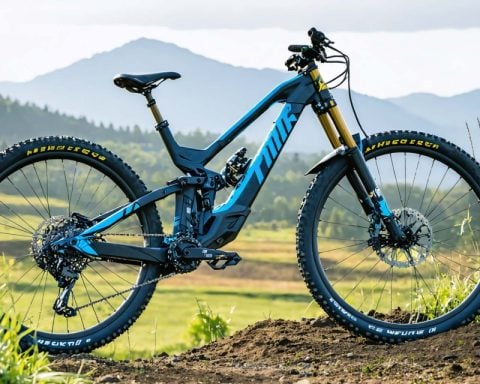The transportation industry is in the midst of a revolution, and bicycles are playing a key role. With companies around the world seeking sustainable and efficient solutions for last-mile delivery, cargo e-bikes have emerged as a viable alternative to traditional delivery vans. These innovative vehicles are reshaping the urban landscape, taking up residence in bike lanes as they transport goods and navigate congested city streets.
Unlike the tricycle-like cargo bikes of the past, modern cargo e-bikes resemble mini-vans on two wheels. Equipped with a sturdy frame and ample space for hauling heavy loads, these vehicles are designed to make last-mile trips easier and more efficient. With their added stability and four-wheel configuration, cargo e-bikes are flexible and versatile, fitting into existing bike lanes alongside traditional bicycles.
One such example is the CityQ, a German-made cargo e-bike that is making waves in the industry. With its unique pedal-assist system and a powerful rear-wheel drive, the CityQ offers a smooth and comfortable ride for both the rider and the cargo. It boasts an impressive payload capacity of 330 pounds and has a range of approximately 50 miles when fully loaded.
While some may question whether cargo e-bikes truly qualify as bicycles, there is no denying their potential to revolutionize the delivery industry. These vehicles offer a sustainable alternative to traditional delivery vans, reducing traffic congestion and emissions in city centers. Moreover, cargo e-bikes can access areas where larger vehicles are restricted, making them ideal for navigating narrow streets and crowded urban environments.
As cities worldwide grapple with the challenges of urbanization, the introduction of cargo e-bikes provides a glimmer of hope for a greener and more efficient future. Though they may be larger and less nimble than traditional bicycles, their ability to transport goods while maintaining a small carbon footprint makes them an attractive option.
While there are still concerns about the impact of cargo e-bikes on bike lane space, the benefits they offer in terms of sustainability and convenience cannot be ignored. As the demand for last-mile delivery continues to grow, it is likely that we will see more of these innovative vehicles on the streets in the coming years.
In conclusion, cargo e-bikes represent a significant shift in the way we think about urban transportation. They are a promising solution to the challenges of last-mile delivery, offering a sustainable and efficient alternative to traditional delivery vans. While they may diverge from the traditional concept of a bicycle, their potential to transform the urban landscape and improve logistics is undeniable. As we look to the future, the rise of cargo e-bikes signals a new era in urban mobility.
The transportation industry is in the midst of a revolution, with cargo e-bikes emerging as a viable alternative to traditional delivery vans. These innovative vehicles are reshaping the urban landscape, providing sustainable and efficient solutions for last-mile delivery.
Cargo e-bikes, such as the German-made CityQ, are designed to make last-mile trips easier and more efficient. With their sturdy frame and ample space for hauling heavy loads, these vehicles offer greater payload capacity and stability. They are also equipped with a pedal-assist system and powerful rear-wheel drive, providing a smooth and comfortable ride for both the rider and the cargo.
The potential of cargo e-bikes to revolutionize the delivery industry cannot be denied. These vehicles offer a sustainable alternative to traditional vans, reducing traffic congestion and emissions in urban centers. Additionally, their ability to access restricted areas and navigate narrow streets makes them ideal for crowded urban environments.
While there are concerns about the impact of cargo e-bikes on bike lane space, the benefits they offer in terms of sustainability and convenience outweigh these concerns. As the demand for last-mile delivery continues to grow, it is likely that we will see more of these innovative vehicles on the streets in the coming years.
The rise of cargo e-bikes signals a new era in urban mobility, providing a greener and more efficient future for transportation. As cities worldwide grapple with urbanization challenges, these vehicles offer a promising solution. The industry is poised for growth, with more companies recognizing the potential of cargo e-bikes as a sustainable alternative for last-mile delivery.
For more information about the cargo e-bike industry and market forecasts, you can visit Cargo Bike Festival, Electrive, and Fritz Hansen. These websites provide insights into the latest trends, innovations, and market forecasts in the cargo e-bike industry.







